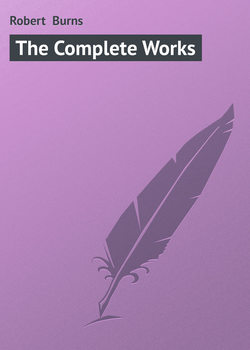Читать книгу The Complete Works - Роберт Бернс, Robert Burns - Страница 92
THE POETICAL WORKS OF ROBERT BURNS
XC. WRITTEN IN FRIARS-CARSE HERMITAGE, ON NITHSIDE. DECEMBER, 1788
Оглавление[Of this Poem Burns thought so well that he gave away many copies in his own handwriting: I have seen three. When corrected to his mind, and the manuscripts showed many changes and corrections, he published it in the new edition of his Poems as it stands in this second copy. The little Hermitage where these lines were written, stood in a lonely plantation belonging to the estate of Friars-Carse, and close to the march-dyke of Ellisland; a small door in the fence, of which the poet had the key, admitted him at pleasure, and there he found seclusion such as he liked, with flowers and shrubs all around him. The first twelve lines of the Poem were engraved neatly on one of the window-panes, by the diamond pencil of the Bard. On Riddel’s death, the Hermitage was allowed to go quietly to decay: I remember in 1803 turning two outlyer stots out of the interior.]
Thou whom chance may hither lead,
Be thou clad in russet weed,
Be thou deck’d in silken stole,
Grave these counsels on thy soul.
Life is but a day at most,
Sprung from night, in darkness lost;
Hope not sunshine ev’ry hour.
Fear not clouds will always lour.
As Youth and Love with sprightly dance
Beneath thy morning star advance,
Pleasure with her siren air
May delude the thoughtless pair:
Let Prudence bless enjoyment’s cup,
Then raptur’d sip, and sip it up.
As thy day grows warm and high,
Life’s meridian flaming nigh,
Dost thou spurn the humble vale?
Life’s proud summits would’st thou scale?
Check thy climbing step, elate,
Evils lurk in felon wait:
Dangers, eagle-pinion’d, bold,
Soar around each cliffy hold,
While cheerful peace, with linnet song,
Chants the lowly dells among.
As the shades of ev’ning close,
Beck’ning thee to long repose;
As life itself becomes disease,
Seek the chimney-nook of ease.
There ruminate, with sober thought,
On all thou’st seen, and heard, and wrought;
And teach the sportive younkers round,
Saws of experience, sage and sound.
Say, man’s true genuine estimate,
The grand criterion of his fate,
Is not—Art thou high or low?
Did thy fortune ebb or flow?
Wast thou cottager or king?
Peer or peasant?—no such thing!
Did many talents gild thy span?
Or frugal nature grudge thee one?
Tell them, and press it on their mind,
As thou thyself must shortly find,
The smile or frown of awful Heav’n,
To virtue or to vice is giv’n.
Say, to be just, and kind, and wise,
There solid self-enjoyment lies;
That foolish, selfish, faithless ways
Lead to the wretched, vile, and base.
Thus, resign’d and quiet, creep
To the bed of lasting sleep;
Sleep, whence thou shalt ne’er awake,
Night, where dawn shall never break,
Till future life, future no more,
To light and joy the good restore,
To light and joy unknown before.
Stranger, go! Hea’vn be thy guide!
Quod the beadsman of Nithside.
